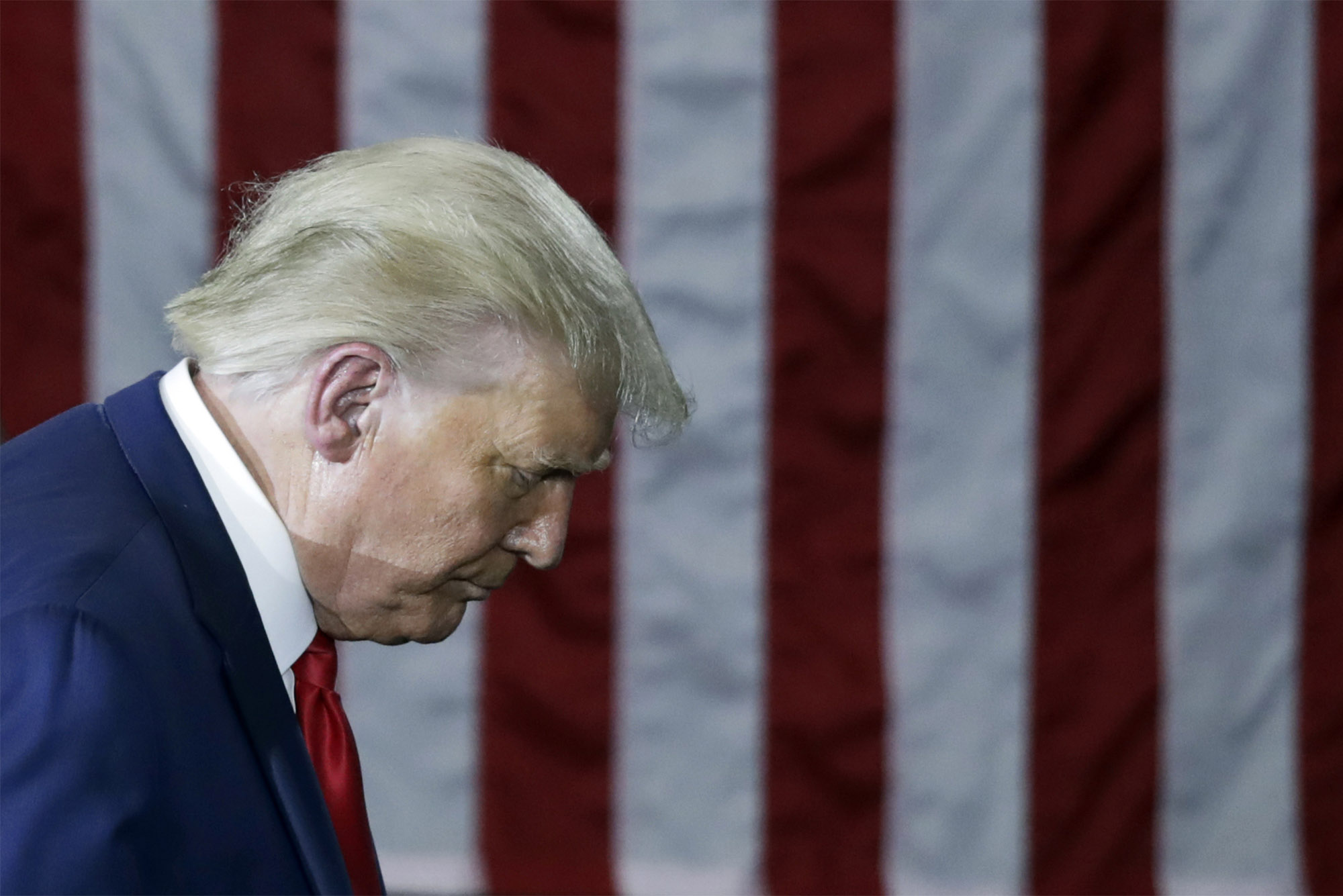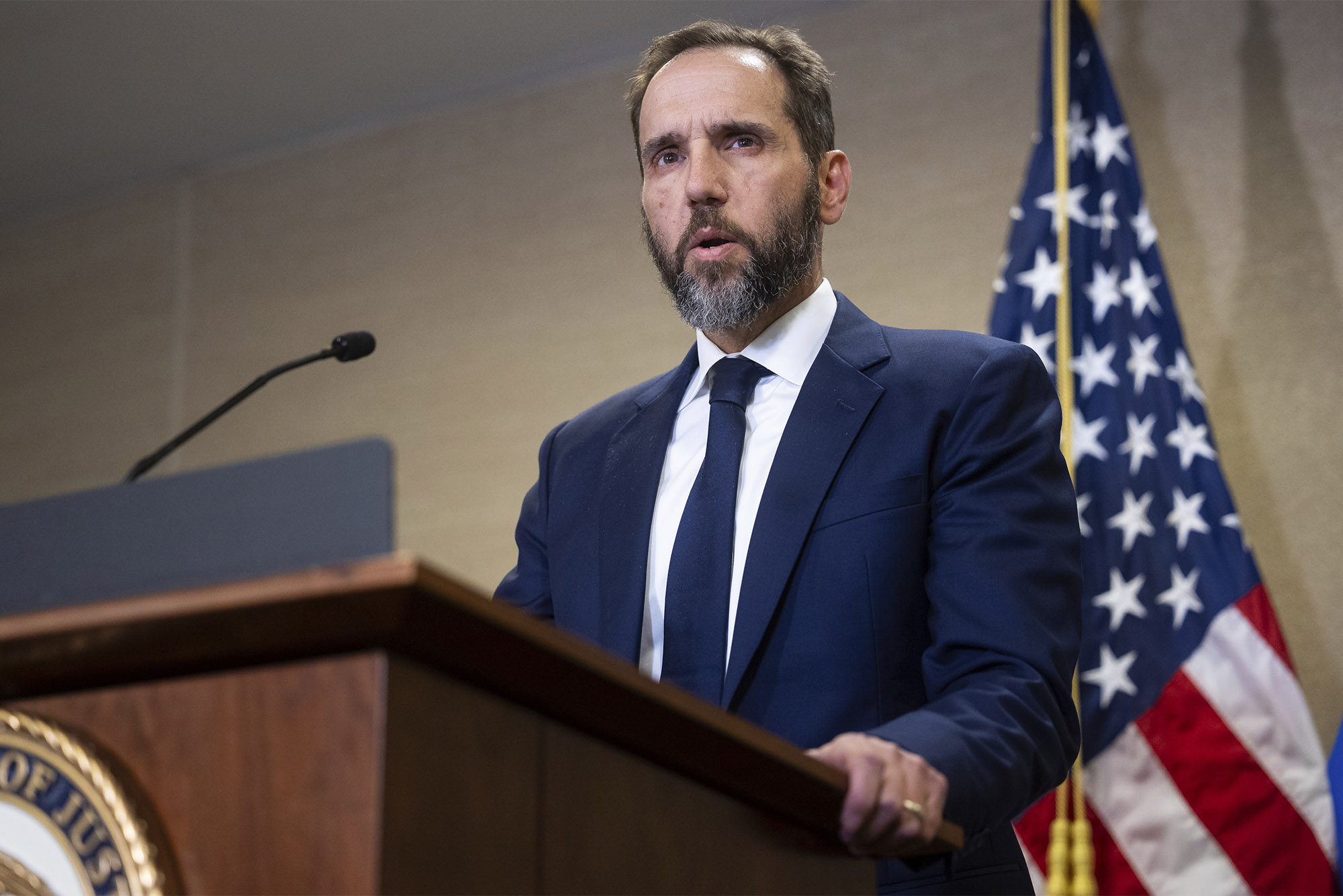Will Donald Trump’s Indictment re: January 6 Jeopardize His 2024 Presidential Bid?

The indictment filed by special counsel Jack Smith August 1 accuses former president Donald Trump of three conspiracy charges and one count of obstructing an official proceeding, in connection to his efforts to overturn the results of the 2020 election. Photo by AP Photo/Tony Dejak
Will Donald Trump’s Indictment re: January 6 Jeopardize His 2024 Presidential Bid?
While the new charges may not erode support from his staunchest supporters, they “could change things financially,” says BU’s Thomas Whalen
Donald Trump’s indictment Tuesday for his alleged role in the attack on the US Capitol on January 6, 2021, alleges a stunning political picture: a president, voted out of office, attempted to use any means possible—including the incitement of violence—to remain in power. It would mean that the free and fair elections process that underpins America’s democracy was mere collateral damage for a man intent on holding on to his position as leader of the free world.
The indictment, filed by special counsel Jack Smith, accuses Trump of three conspiracies in connection to his efforts to overturn the results of the 2020 election: first, to defraud the United States; second, to obstruct an official government proceeding, the certification of the Electoral College vote; and third, to deprive people of a civil right, the right to have their votes counted. Trump was also charged with a fourth count of obstructing or attempting to obstruct an official proceeding.
“Despite having lost, [Trump] was determined to remain in power. So for more than two months following election day on November 3, 2020, [he] spread lies that there had been outcome-determinative fraud in the election and that he had actually won. These claims were false, and [Trump] knew that they were false. But [he] repeated and widely disseminated them anyway to make his knowingly false claims appear legitimate, create an intense national atmosphere of mistrust and anger, and erode public faith in the administration of the election,” the indictment says.
Tuesday’s indictment, which stems from a special investigation into the events that unfolded on January 6, 2021, and in the months following the election, marks the third time Trump has been charged with crimes related to his time in office. A fourth investigation, related to his efforts to reverse his election loss in Georgia, is still ongoing.
BU Today spoke with Thomas Whalen, an associate professor of social sciences at the College of General Studies, and Jed Shugerman, a professor and Joseph Lipsitt Scholar at the School of Law, about what it all means and what comes next.
Q&A
With Thomas Whalen and Jed Shugerman
BU Today: Did any of the charges surprise you?
Whalen: The charges did not surprise me so much as some of the details provided [in the indictment], such as the bombshell that the former president told a skeptical then-acting Attorney General Jeffrey Rosen on December 27, 2020, that he should just say, “the election was corrupt and leave it to me.” The remarks are breathtakingly cynical, with little or no regard for the legal and constitutional institutions of this country. I’d expect such things from autocratic-minded leaders such as Viktor Orban of Hungary, not a former president of the United States.
BU Today: Can you situate these charges within a social or historical context? What makes them so extraordinary?
Whalen: What makes them so sensational is that it accuses Trump of trying to prevent the results of a free and fair election from being certified, despite knowing there was no fraud and corruption. It shows that he thinks objective truth is something that can be disposed of in the same manner as an empty soda can—if it does not neatly serve his political interests. What he forgets is that facts are indeed stubborn things.
BU Today: What makes these charges different from Trump’s previous two indictments?
Shugerman: The bottom line is, this case should go first of all the cases. This indictment seems strong on its face, though it’s probably not quite as strong as the prosecution in Florida on classified documents at Mar-a-Lago, just in terms of the apparent amount of evidence and the clarity of the law. The Florida case seems to have more concrete evidence of his state of mind (like a recording in which Trump admitted that he had not declassified the document he was showing off), more concrete evidence of obstruction and destruction of evidence, and more cooperating witnesses at this stage. The law also seems clearer.
In comparison, the January 6 case always had a significant challenge of Trump claiming a First Amendment right to raise good-faith questions about an election and to protest. The indictment shows significant evidence that Trump’s awareness and conduct were more than questions and advocacy, but [rose to the level of] actual election fraud, with the fake elector plot as a broad conspiracy similar to stuffing ballot boxes with fake ballots. Nevertheless, the First Amendment claims still will be hurdles.
BU Today: Why should the timeline for this election-fraud case be pushed up?
Shugerman: There are still two or three reasons this case should be pushed first ahead on the calendar, even if it is not quite as strong in terms of evidence and precedent.
First, polling suggests that the public sees the January 6 insurrection as a more serious case, a more direct attack on democracy, and generally holds Trump more responsible. In the Florida case, one challenge for public perception is that other presidents and vice presidents, including Biden, have had problems with keeping classified documents, which can muddy up a trial.
Second, the classified documents create a Catch-22 for the prosecution about which documents to enter as evidence: enough to prove a national security, but not such a risk that you’d create a danger [in] making them public in a public trial. Moreover, other classified documents cases have been delayed by this kind of process, and such a delay seems even more inevitable here. Many experts have guessed that the trial would not be complete by the [2024] election.
Third, the judge and jury pool in Florida are unpredictable. The judge and jury pool in DC, however, are more reliable. And if one asks if it’s fair for a DC jury to be deciding such a politically charged case, I borrow from the classic advice, “If you can’t do the time, don’t do the crime”: if you don’t like the jury pool, don’t do the crime there, fool.
BU Today: Do you think any of the charges will stick?
Shugerman: It is just too soon to say. But for the reasons above, I think the January 6 prosecution has the best chance of getting a conviction before the election. The January 6 indictment includes many details about Georgia, which strengthens a Fulton County [Ga.] prosecution, and that case might also have a good chance.

BU Today: This is—to use a phrase that’s become familiar in recent years—unprecedented territory. How do you think special counsel Jack Smith will approach his legal strategy?
Shugerman: It seems Smith has gotten cooperation from some key witnesses in Florida and in DC. The most important strategic decisions now are how to get the most cooperation from them and how to get more co-conspirators to cooperate. After that, he needs to strategize how to get a trial started and finished before the election. And then the most important strategies are jury selection and how to avoid First Amendment issues or other legal problems that could leave room for reversal on appeal.
BU Today: Republicans continued to throw their support behind Trump after his previous indictments. Do you expect these charges will change that?
Whalen: I think they can change things financially. So much of the money Trump is raising is going to have to be devoted to his legal defense here and for the other two indictment cases instead of for important campaign expenditures, such as the hiring of necessary campaign staff to set up effective get-out-the-vote ground operations in key swing states, and the purchase of television and media ads. Also, while he should be unaffected in the Republican primaries, independent voters might not be so willing to give him a pass in the general election as his rabid supporters.
BU Today: These charges get right to the heart of this country’s democracy, accusing Trump of attempting to undermine an election. Although they don’t prevent Trump from continuing to run for office again, do you expect they’ll have an effect on his chances?
Whalen: It will make no impact on Trump’s base Republican voters; in fact he’s a shoo-in at this moment for the Republican presidential nomination. However, independent voters will take a dim view of recent events, which might swing the election toward Joe Biden and the Democrats—and in the process render the Republican Party international irrelevance.
If convicted of the charges before the election, several states could theoretically decline to put Trump on their ballots, citing the provisions of the 14th Amendment. This outcome would surely lead to a court challenge and eventually wend its way up to the Supreme Court. It would make the controversial Bush v. Gore case look like The Bobbsey Twins Go to the Seashore by comparison.

Comments & Discussion
Boston University moderates comments to facilitate an informed, substantive, civil conversation. Abusive, profane, self-promotional, misleading, incoherent or off-topic comments will be rejected. Moderators are staffed during regular business hours (EST) and can only accept comments written in English. Statistics or facts must include a citation or a link to the citation.